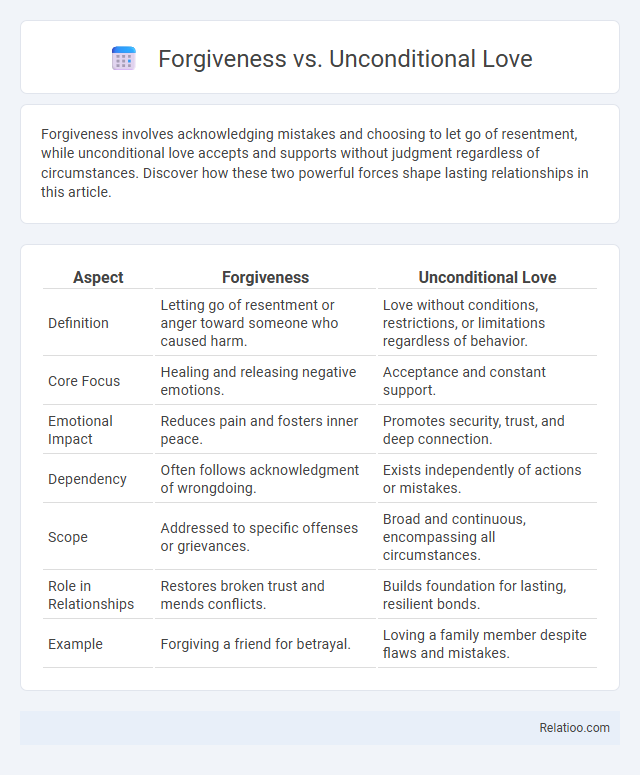Forgiveness involves acknowledging mistakes and choosing to let go of resentment, while unconditional love accepts and supports without judgment regardless of circumstances. Discover how these two powerful forces shape lasting relationships in this article.
Table of Comparison
| Aspect | Forgiveness | Unconditional Love |
|---|---|---|
| Definition | Letting go of resentment or anger toward someone who caused harm. | Love without conditions, restrictions, or limitations regardless of behavior. |
| Core Focus | Healing and releasing negative emotions. | Acceptance and constant support. |
| Emotional Impact | Reduces pain and fosters inner peace. | Promotes security, trust, and deep connection. |
| Dependency | Often follows acknowledgment of wrongdoing. | Exists independently of actions or mistakes. |
| Scope | Addressed to specific offenses or grievances. | Broad and continuous, encompassing all circumstances. |
| Role in Relationships | Restores broken trust and mends conflicts. | Builds foundation for lasting, resilient bonds. |
| Example | Forgiving a friend for betrayal. | Loving a family member despite flaws and mistakes. |
Understanding Forgiveness: A Foundational Overview
Understanding forgiveness involves recognizing it as a conscious decision to release resentment and anger toward someone who has caused harm, promoting emotional healing and personal growth. Unlike unconditional love, which is an unwavering, selfless affection regardless of circumstances, forgiveness centers on addressing and resolving specific grievances. This foundational process fosters reconciliation and peace, serving as a critical step in developing deeper, unconditional love over time.
Defining Unconditional Love: Meaning and Misconceptions
Unconditional love means accepting and caring for someone without limitations or expectations, regardless of flaws or mistakes. Common misconceptions include believing it requires ignoring harmful behavior or suppressing personal boundaries, whereas true unconditional love involves healthy respect and compassion. Your understanding of unconditional love grows deeper when distinguishing it from forgiveness, which is a conscious decision to let go of resentment but doesn't necessarily imply limitless acceptance.
Core Differences: Forgiveness vs Unconditional Love
Forgiveness involves consciously letting go of resentment or anger toward someone who has caused harm, while unconditional love means offering love without any conditions or expectations regardless of circumstances. The core difference lies in forgiveness addressing a specific wrong to restore harmony, whereas unconditional love represents a continuous, unwavering emotional commitment that transcends any actions or behaviors. Forgiveness can be seen as a process that may lead to or arise from unconditional love, but it is not synonymous with the boundless, nonjudgmental nature of unconditional love itself.
Psychological Benefits of Forgiveness
Forgiveness promotes psychological well-being by reducing stress, anxiety, and depression while fostering emotional healing and resilience. It helps release negative emotions, such as anger and resentment, enabling individuals to experience greater inner peace and improved mental health. Unlike unconditional love, which emphasizes acceptance without conditions, forgiveness specifically targets the alleviation of emotional pain and promotes recovery from interpersonal harm.
The Power of Unconditional Love in Relationships
The power of unconditional love in relationships lies in its ability to foster deep trust and lasting connection, transcending flaws and mistakes without judgment. Unlike forgiveness, which addresses specific hurtful actions, unconditional love creates a foundation where Your partner feels valued for who they truly are, promoting emotional safety and resilience. This unwavering acceptance nurtures growth and harmony, enabling relationships to thrive even through challenges.
Can Forgiveness Exist Without Unconditional Love?
Forgiveness is often viewed as a conscious choice to release resentment, but it can be limited or conditional without the foundation of unconditional love, which embraces acceptance and compassion regardless of circumstances. Unconditional love fosters an environment where true forgiveness thrives by removing judgment and enabling emotional healing beyond transactional exchanges. Your capacity to forgive deepens when rooted in unconditional love, as it transforms forgiveness from an obligation into a sincere, transformative act of grace.
The Interplay: How Forgiveness and Unconditional Love Connect
Forgiveness and unconditional love are deeply intertwined, as forgiveness allows you to release resentment and open your heart to unconditional love, creating a powerful cycle of healing and acceptance. When you forgive, you acknowledge humanity's imperfections, enabling unconditional love to flourish without limits or conditions. This interplay strengthens relationships by fostering empathy, compassion, and emotional resilience, ultimately transforming conflicts into opportunities for growth.
Practical Steps to Cultivate Forgiveness
Cultivating forgiveness involves recognizing personal pain and choosing to release resentment to foster emotional healing and healthier relationships. Practical steps include acknowledging feelings without judgment, practicing empathy towards oneself and others, and actively reframing negative experiences to reduce emotional triggers. Consistent mindfulness meditation and journaling can reinforce forgiveness by promoting self-awareness and compassion integral to unconditional love.
Building Unconditional Love: Habits and Mindsets
Building unconditional love requires cultivating habits such as active listening, empathy, and patience to foster genuine connection. Developing a mindset centered on acceptance without judgment promotes resilience in relationships and nurtures emotional safety. Consistently practicing gratitude and forgiveness helps dissolve barriers, enabling unconditional love to thrive beyond conditions or expectations.
Choosing Compassion: Harmonizing Forgiveness and Unconditional Love
Choosing compassion involves harmonizing forgiveness and unconditional love by embracing empathy without conditions and releasing resentment. Forgiveness frees the heart from past grievances, allowing unconditional love to flourish in relationships regardless of flaws or mistakes. This balance nurtures emotional resilience and deeper human connections rooted in understanding and acceptance.

Infographic: Forgiveness vs Unconditional Love
 relatioo.com
relatioo.com